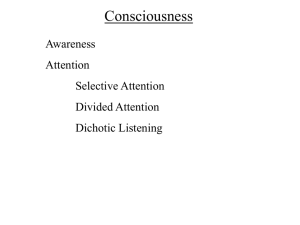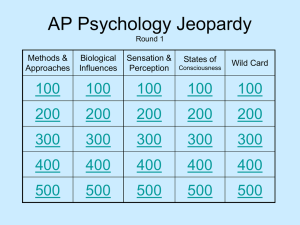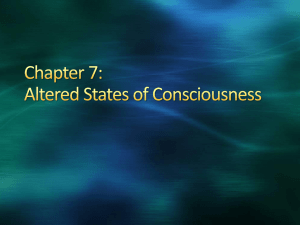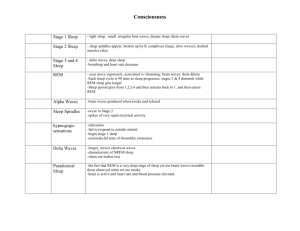Psychology Chapter 6 Review - Course
advertisement
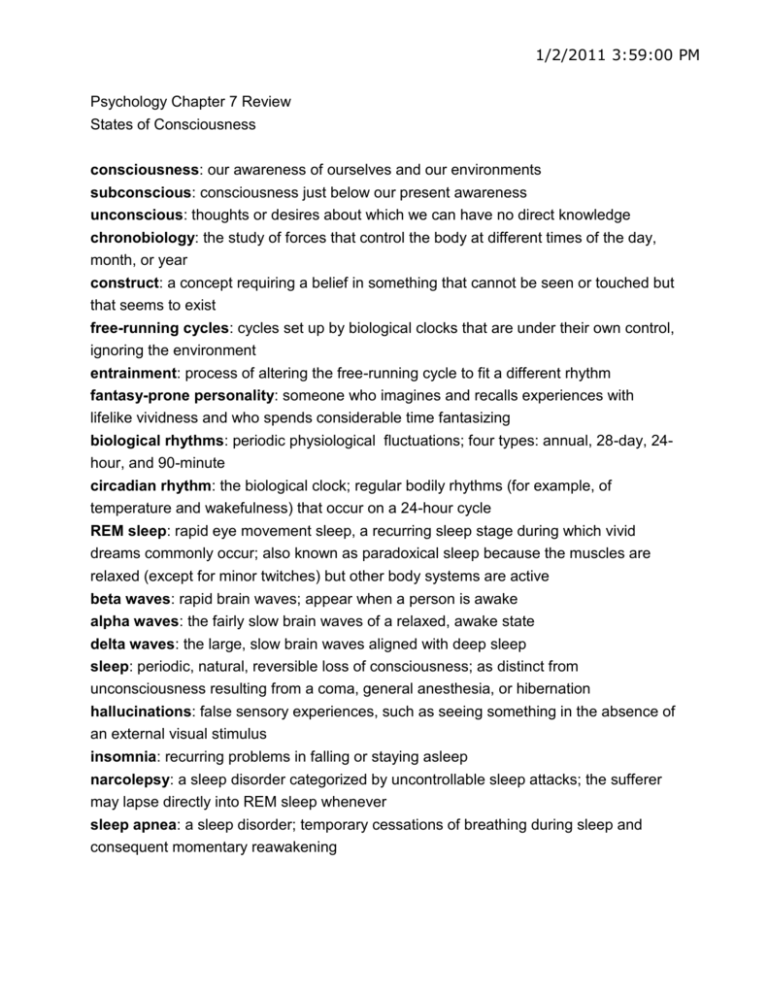
1/2/2011 3:59:00 PM Psychology Chapter 7 Review States of Consciousness consciousness: our awareness of ourselves and our environments subconscious: consciousness just below our present awareness unconscious: thoughts or desires about which we can have no direct knowledge chronobiology: the study of forces that control the body at different times of the day, month, or year construct: a concept requiring a belief in something that cannot be seen or touched but that seems to exist free-running cycles: cycles set up by biological clocks that are under their own control, ignoring the environment entrainment: process of altering the free-running cycle to fit a different rhythm fantasy-prone personality: someone who imagines and recalls experiences with lifelike vividness and who spends considerable time fantasizing biological rhythms: periodic physiological fluctuations; four types: annual, 28-day, 24hour, and 90-minute circadian rhythm: the biological clock; regular bodily rhythms (for example, of temperature and wakefulness) that occur on a 24-hour cycle REM sleep: rapid eye movement sleep, a recurring sleep stage during which vivid dreams commonly occur; also known as paradoxical sleep because the muscles are relaxed (except for minor twitches) but other body systems are active beta waves: rapid brain waves; appear when a person is awake alpha waves: the fairly slow brain waves of a relaxed, awake state delta waves: the large, slow brain waves aligned with deep sleep sleep: periodic, natural, reversible loss of consciousness; as distinct from unconsciousness resulting from a coma, general anesthesia, or hibernation hallucinations: false sensory experiences, such as seeing something in the absence of an external visual stimulus insomnia: recurring problems in falling or staying asleep narcolepsy: a sleep disorder categorized by uncontrollable sleep attacks; the sufferer may lapse directly into REM sleep whenever sleep apnea: a sleep disorder; temporary cessations of breathing during sleep and consequent momentary reawakening night terrors: a sleep disorder characterized by high arousal and an appearance of being terrified; unlike nightmares, night terrors occur during stage 4 sleep, within 2 or 3 hours of falling asleep, and are seldom remembered dream: a sequence of images, emotions, and thoughts passing through a sleeping person’s mind; dreams are notable for their hallucinatory imagery, discontinuities, and incongruities, and for the dreamer’s delusional acceptance of the contents and later difficulties remembering it manifest content: according to Freud, the remembered story line of a dream (as distinct from its latent content) latent content: according to Freud, the underlying meaning of a dream; Freud believed that this content functions as a safety valve REM rebound: tendency for REM sleep to increase following REM sleep deprivation (caused by repeated awakenings in REM sleep) hypnosis: a social interaction in which one person (the hypnotist) suggests to another (the subject) that certain perceptions, feelings, thoughts, or behaviors will spontaneously occur posthypnotic amnesia: supposed inability to recall what one experienced during hypnosis induced by the hypnotist’s suggestion posthypnotic suggestion: a suggestion, made during a hypnosis session, to be carried out after the subject is no longer hypnotized; used by some to help control undesired symptoms and behaviors dissociation: a split in consciousness, which allows some thoughts and behaviors to occur simultaneously with others hidden observer: Hilgard’s term; a hypnotized subject’s awareness of experiences, such as pain, that go unreported during hypnosis psychoactive drug: a chemical substance that alters perceptions and mood tolerance: the diminishing effect with regular use of the same dose of a drug, requiring the user to take larger and larger doses before experiencing the drug’s effect withdrawal: the discomfort and distress that follow discontinuing the use of an addictive drug physical dependence: a physiological need for a drug, marked by unpleasant withdrawal symptoms when the drug is discontinued psychological dependence: a psychological need to use a drug, such as to relieve negative emotions depressants: drugs (such as alcohol, barbiturates, and opiates) that reduce neural activity and slow down body functions stimulants: drugs (such as caffeine, nicotine, and the more powerful amphetamines and cocaine) that excite neural activity and speed up body functions hallucinogens: psychedelic (“mind-manifesting”) drugs, such as LSD, that distort perceptions and evoke sensory images in the absence of sensory input barbiturates: drugs that depress the activity of the central nervous system, reducing anxiety but impairing memory and judgment opiates: opium and its derivatives, such as morphine and heroin; they depress neural activity, temporarily lessening pain and anxiety amphetamines: drugs that stimulate neural activity, causing sped up body functions and associated energy and mood changes LSD: a powerful hallucinogenic drug; also known as acid THC: the major active ingredient in marijuana; triggers a variety of effects, including mild hallucinations near-death experience: an altered state of consciousness reported after a close brush with death (such as through cardiac arrest); often similar to drug-induced hallucinations dualism: presumption that mind and body are two distinct entities that interact monism: presumption that mind and body are different aspects of the same thing

